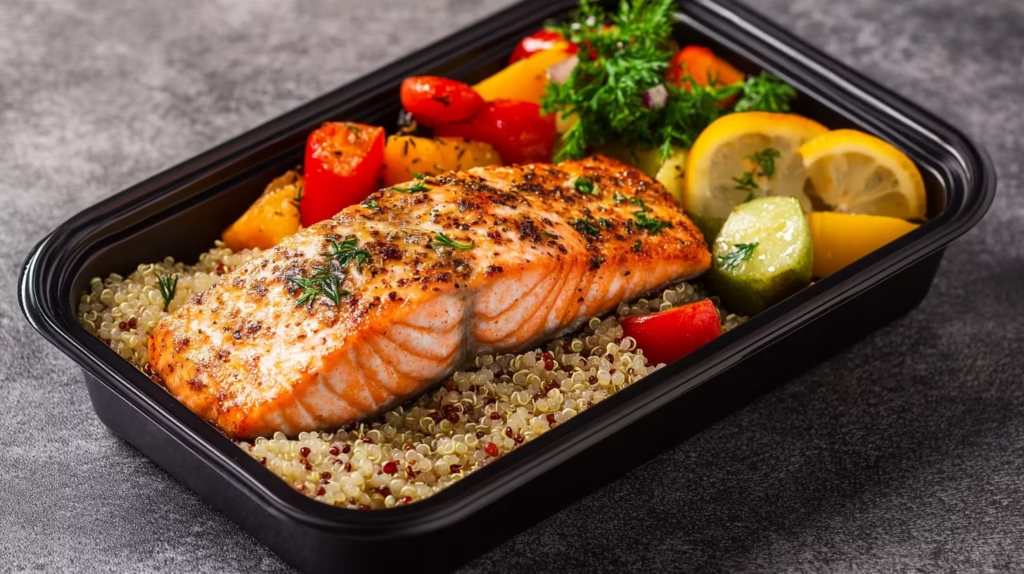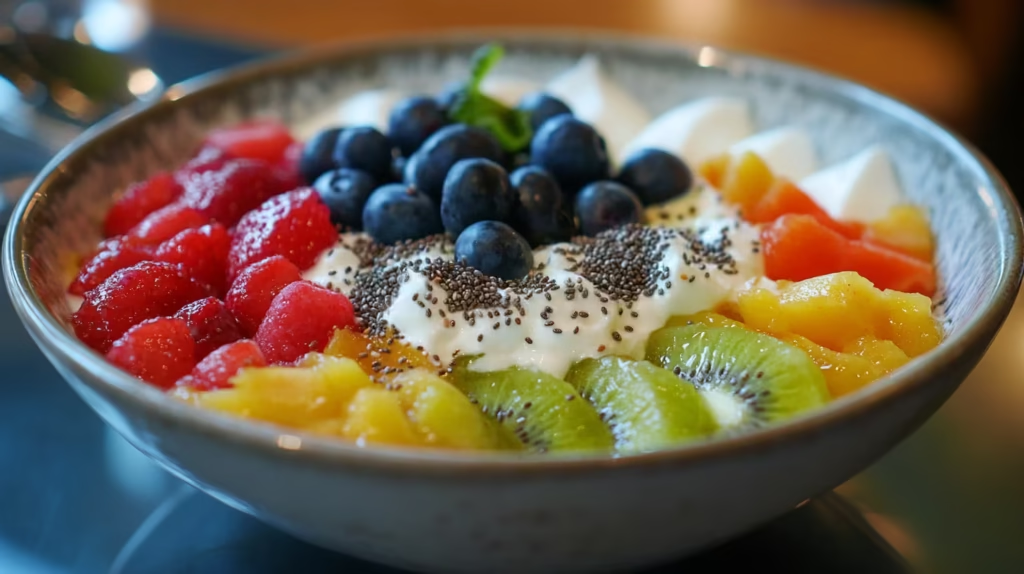After weight loss surgery, your nutrition journey changes. You’ll find delicious bariatric recipes that make meal planning fun. It becomes a journey of healing and wellness.
Your diet after surgery isn’t just about what you can’t eat. It’s about eating foods that help your body heal. Bariatric recipes are designed to meet your nutritional needs and keep meals tasty.
Healthy meals after surgery are more than just low-calorie. They’re carefully planned to support your recovery and health. You can make meals that give you the proteins, vitamins, and minerals you need.
Imagine eating meals that help you lose weight and feel full of energy. Bariatric recipes can change how you see food. They help you stay healthy for the long term.
Every recipe we share is made to fit your nutritional needs. You’ll find meals that help you control portions, get enough protein, and enjoy your food. It’s all about making your new diet exciting.
Jump to
Understanding Bariatric Recipes
After weight loss surgery, your nutrition journey changes a lot. Bariatric recipes guide you to better health. They help you adjust to new dietary needs and get the nutrients your body needs. These gastric sleeve recipes support your recovery and weight loss goals.

Eating less is not just about cutting calories. It’s about choosing the right foods. High-protein bariatric dishes are key to keeping muscle and aiding healing.
What Are Bariatric Recipes?
Bariatric recipes are meals made for specific nutritional needs. They focus on:
- High protein content
- Low-carb diet meals
- Nutrient-dense ingredients
- Small portion sizes
Importance of Nutrition After Surgery
| Nutrient | Daily Recommendation | Purpose |
|---|---|---|
| Protein | 60-90g | Muscle maintenance |
| Fiber | 25-30g | Digestive health |
| Vitamins | Personalized supplements | Prevent deficiencies |
Weight Loss and Dietary Changes
Your diet after surgery needs careful planning. Low-carb diet meals help manage weight and provide needed nutrients. Eating small, frequent meals and being mindful of what you eat are key to success.
Every bite matters in your journey. Focus on quality nutrients, listen to your body, and work with your healthcare team. Together, you can create a lasting eating plan.
Key Ingredients for Bariatric Recipes
Creating healthy meals after bariatric surgery needs careful picking of ingredients. Your diet should include foods rich in nutrients to aid in healing and weight control. It’s important to choose ingredients that are low in calories but high in nutrition.

Lean Proteins for Recovery
Protein is very important after bariatric surgery. You should aim to eat 60-75 grams of protein daily. This helps keep your muscles strong and aids in recovery. Good protein sources include:
- Grilled chicken breast
- Turkey meatballs (which can provide up to 35g protein per serving)
- Baked fish
- Greek yogurt
- Eggs
Low-Carb Vegetables for Nutrition
Vegetables are key in healthy meals after bariatric surgery. They offer important vitamins and minerals without many calories. Choose these low-carb options:
- Spinach
- Zucchini
- Bell peppers
- Cucumber
- Cauliflower
Healthy Fats and Nutritious Grains
Your diet should also include healthy fats and certain grains. Nutrient absorption is key for your diet after surgery. Here are some good choices:
- Avocado
- Nuts and seeds
- Quinoa
- Chia seeds
- Olive oil
Keep your portions small, about 1/2 to 1 cup. This helps with weight loss and meeting your nutritional needs.
Breakfast Ideas for Bariatric Diets
Starting your day with nutrient-dense bariatric recipes can change your morning. High-protein bariatric dishes give you the nutrition you need and keep you full. It’s important to pick the right breakfast to keep your energy up and support your weight loss.
After bariatric surgery, breakfast planning is key. Your meals should be high in protein, low in carbs, and meet your nutritional needs. Here are some tasty and healthy breakfast ideas that fit your diet goals.
Protein-Packed Smoothies
Smoothies are a quick and easy breakfast for bariatric patients. Make your smoothie with:
- Greek yogurt as a protein base
- Spinach for added nutrients
- Protein powder for extra muscle support
- Small amounts of berries for flavor
A protein-rich smoothie helps you meet your daily nutrition needs and is easy on your stomach. You can make these high-protein bariatric dishes in no time.
Scrambled Eggs with Spinach
Eggs are a great protein source for bariatric patients. A Green Omelette is packed with nutrients:
- 180 calories per serving
- 19g of protein
- Low in carbohydrates
- Rich in vitamins like B2 (45%) and K (123%)
Overnight Oats with Greek Yogurt
Make your overnight oats with Greek yogurt for a protein-rich breakfast. Mix rolled oats, Greek yogurt, chia seeds, and a bit of fruit. Refrigerate it overnight for a nutritious and tasty bariatric recipe.
Lunch Options That Satisfy
Finding the right lunch after bariatric surgery can be tough. You need to balance taste, nutrition, and portion sizes. Choosing the right foods is key to staying healthy and on track.
Low-carb meals are important for keeping weight off and getting the right nutrients. Here are some tasty and nutritious lunch ideas to keep your meal plan exciting.
Quinoa Salad with Grilled Chicken
This lunch is full of protein and complex carbs. It’s a great mix for your body.
- High-quality protein from grilled chicken
- Fiber-rich quinoa
- Essential vitamins and minerals
Vegetable Soup with Lean Turkey
This soup is packed with nutrients and is low in calories. It’s a great choice for your weight loss journey.
- Low-calorie option
- High protein content
- Hydrating vegetable base
Lettuce Wraps with Avocado and Tuna
This lunch is light but full of nutrients. It’s a great alternative to heavy sandwiches.
- Omega-3 fatty acids from tuna
- Healthy fats from avocado
- Low-carb alternative to traditional sandwiches
| Lunch Option | Protein (g) | Calories |
|---|---|---|
| Quinoa Chicken Salad | 35 | 350 |
| Turkey Vegetable Soup | 25 | 250 |
| Tuna Lettuce Wraps | 30 | 300 |
Pro tip: Always check with your healthcare provider to make sure these lunch ideas fit your dietary needs after bariatric surgery.
Delicious Dinner Recipes to Enjoy
Choosing dinner after gastric sleeve surgery can be tough. But, with the right meals, you’ll find tasty and healthy options. Your dinner should have lean proteins, low-carb veggies, and smart cooking methods.
When making gastric sleeve recipes, aim for meals rich in protein and nutrients. These meals should keep you full without straining your stomach. Here are some tasty dinner ideas that follow bariatric diet guidelines:
Baked Salmon with Asparagus
Salmon is a great source of protein and omega-3s. Salmon bites make a perfect portioned meal. Serve it with roasted asparagus for a low-carb veggie packed with nutrients.
- Choose wild-caught salmon for maximum nutritional benefits
- Use herbs like dill or lemon for added flavor without extra calories
- Bake at 400°F for approximately 12-15 minutes
Cauliflower Rice Stir-Fry
Make a bariatric-friendly stir-fry by swapping rice for cauliflower rice. This low-carb choice helps you stay on track with your weight loss goals while enjoying a tasty dish.
- Use lean protein like chicken or tofu
- Include colorful vegetables for added nutrition
- Season with low-sodium soy sauce or herbs
Zucchini Noodles with Marinara
Zucchini noodles are a great pasta substitute for those looking for healthy meals after surgery. Top them with a light marinara sauce and lean protein for a fulfilling dinner that meets your nutritional needs.
- Use a spiralizer to create thin zucchini noodles
- Add grilled chicken or turkey for protein
- Choose a low-sugar marinara sauce
Snack Ideas That Fit the Bariatric Plan
Choosing snacks after bariatric surgery can be tough. It’s important to pick low-calorie options that help with nutrition and weight loss. Look for snacks that are high in protein and nutrients to keep you full between meals.
Your snack plan should include high-protein, low-volume foods. These snacks give you the nutrients you need. Recipes for bariatric snacks can help you meet your health goals.
Greek Yogurt with Berries
Greek yogurt with berries is a great snack. It’s full of protein and antioxidants:
- High protein content (approximately 15-20 grams per serving)
- Low in calories
- Rich in probiotics
- Provides essential vitamins and minerals
Hummus with Cucumber Slices
This snack is crunchy and nutritious. It’s often recommended in bariatric recipes for its:
- Low-calorie profile
- High protein content from chickpeas
- Hydrating cucumber slices
- Nutrient-dense ingredients
Cottage Cheese and Pineapple
This snack is a tasty mix of protein and sweetness. It supports your nutritional needs:
- Excellent source of protein
- Low in calories
- Contains essential vitamins
- Supports muscle maintenance
For successful bariatric meal plans, choose snacks wisely. Focus on quality over quantity to support your health and weight loss goals.
Tips for Meal Prepping Success – Bariatric Recpes
Learning to prep meals for bariatric diets can change your eating habits. With good planning and techniques, you’ll make healthy eating easier. This is key for those adjusting to new dietary needs after surgery.
Planning Your Weekly Menu
Start with a detailed meal plan for bariatric prep. Aim for meals that are full of nutrients and fit your diet needs. Here are some helpful tips:
- Make a detailed weekly meal plan
- Choose recipes that use few ingredients
- Focus on lean proteins and veggies
Portion Control Strategies
Controlling portions is vital for post-surgical eating. Your meals should be small but full of nutrients. Studies show that portion control can cut down food waste by 25%.
| Meal Type | Recommended Portion | Protein Content |
|---|---|---|
| Protein Serving | 2-3 oz | 15-20g |
| Vegetable Serving | 1/2 cup | 2-4g |
| Grain Serving | 1/4 cup | 2-3g |
Storing and Reheating Meals
Storing meals right is key to bariatric prep. Use good containers and learn how to reheat safely. A detailed guide can help keep your meals fresh and safe.
- Choose glass containers with tight lids
- Mark meals with the date they were made
- Put meals in the fridge within two hours of cooking
- Eat refrigerated meals in 3-4 days
Pro tip: Batch cooking can save up to 60% of your meal prep time. It makes your prep work both efficient and fun.
Adapting Traditional Recipes for Bariatric Needs
Changing your favorite dishes into bariatric-friendly recipes doesn’t mean losing flavor. You can enjoy familiar foods while meeting your nutritional goals after surgery.
Adapting recipes for a low-carb diet means focusing on nutrients, portion sizes, and smart swaps. It’s all about making your meals healthier without losing taste.
Lightened-Up Pasta Dishes
Pasta fans can enjoy tasty meals with these tweaks:
- Try zucchini noodles or spaghetti squash instead of regular pasta
- Choose protein-rich pasta options
- Add more veggies to your sauce
- Stick to 1/4 cup cooked pasta per serving
Low-Calorie Comfort Food Versions
Comfort foods can get a healthy makeover:
- Use lean turkey instead of ground beef in meatloaf
- Replace cream with Greek yogurt in casseroles
- Bake chicken or fish instead of frying
- Add more veggies to classic dishes
Transforming Desserts into Healthy Treats
Enjoy sweet treats that are also good for you:
- Make protein-rich puddings with Greek yogurt
- Bake with almond flour for fewer carbs
- Try natural sweeteners like stevia
- Add fresh fruits for sweetness
Adapting recipes for bariatric needs takes creativity and patience. Try new ingredients and methods to find meals that are both tasty and healthy.
Staying Motivated with Your Meal Plan
After bariatric surgery, losing weight is more than just eating right. You need motivation, planning, and support to reach your health goals.
Setting Realistic Goals
Setting goals you can reach is key for lasting weight loss. Make sure your meal plans are realistic. Here are some tips:
- Break down your weight loss goal into smaller, monthly targets
- Use apps or journals to track your progress
- Celebrate small wins like more energy or fitting into clothes better
Tracking Your Progress
Keeping track of your journey boosts motivation. Use digital tools to make tracking fun and easy:
- Take monthly body measurements
- Take photos of your progress every three months
- Log what you eat and how much protein you get each day
Finding Support and Resources
Studies show support is vital after surgery. Online groups offer encouragement and shared experiences.
- Join forums for bariatric surgery support
- Go to virtual workshops on nutrition
- Connect with nutrition experts for post-surgery advice
Remember, your bariatric journey is unique. Stay patient, consistent, and kind to yourself throughout the process.
Conclusion: Embrace Bariatric Cooking
Your journey to better health is a long-term commitment. It requires dedication and creativity. Learning to make healthy meals becomes easier as you adapt your cooking and understand your body’s needs.
Stay flexible and patient as you explore new recipes. This will help you find your way in the world of bariatric cooking.
Continuing Your Journey to Better Health
Focus on eating protein-rich foods and nutrients carefully chosen for you. Aim for 60-80 grams of protein daily to keep your muscles strong. This supports your overall health.
Choose quality ingredients and eat mindfully. This can change how you see food and help you reach your health goals.
Exploring New Recipes and Flavors
Don’t think you have to give up flavor for bariatric meals. Try making dishes like Mediterranean Shrimp Skewers or Thai Peanut Tofu Stir-Fry. These can be both tasty and healthy.
Try different cooking methods like grilling, baking, and stir-frying. This can open up a world of flavors that are good for you.
Building a Sustainable Eating Habit
Your post-surgery nutrition is for life. Spread out your vitamins and drink 48-60 ounces of water daily. Always listen to your body’s hunger and fullness signals.
With hard work and a positive attitude, you can make a healthy eating plan. This plan will support your ongoing wellness journey.
FAQ
What are bariatric recipes and why are they important?
Bariatric recipes are meals made for people after weight loss surgery. They help meet nutritional needs with smaller portions and fewer calories. These recipes focus on protein, vitamins, and minerals.
How soon after surgery can I start trying new recipes?
Your diet will change after surgery. First, you’ll have clear liquids, then pureed foods, and later soft and solid foods. Always check with your doctor or dietitian before trying new recipes.
What are the most important nutrients to focus on in bariatric meals?
Protein is key after surgery. Eat lean proteins like turkey, chicken, fish, and Greek yogurt. Also, include low-carb veggies, healthy fats, and foods full of vitamins and minerals.
How can I ensure I’m getting enough protein in my diet?
Eat foods high in protein like eggs, lean meats, fish, Greek yogurt, cottage cheese, and protein shakes. Aim for 60-80 grams of protein a day. Use protein supplements if needed, but talk to your healthcare team first.
What portion sizes should I follow after bariatric surgery?
Start with small portions, about 1/4 to 1/2 cup per meal. As you get better, you can eat up to 1 cup. Eat slowly and stop when you’re full to avoid discomfort.
Are there foods I should completely avoid after bariatric surgery?
Stay away from sugary foods, empty calories, and hard-to-digest items. Avoid carbonated drinks, alcohol, fried foods, tough meats, bread, and high-fat foods. Stick to soft, protein-rich foods that are easy to digest.
How can I make my meals more interesting while following bariatric guidelines?
Use herbs, spices, and low-calorie seasonings to add flavor. Try grilling, baking, or steaming instead of frying. Experiment with different proteins and veggies to keep your meals exciting and healthy.
What are some quick and easy meal prep ideas for bariatric patients?
Prepare smoothie packs, pre-cut veggies, hard-boiled eggs, and lean meats in small portions. Use small containers for portion control. Try quick meals like Greek yogurt parfaits or chicken and veggie casseroles.
How do I handle dining out after bariatric surgery?
Choose restaurants with flexible menus. Opt for protein-rich dishes and ask for smaller portions. Modify meals if needed. Avoid bread and fried foods and take leftovers home to keep portions right.
What should I do if I’m struggling to stick to my bariatric meal plan?
Join bariatric support groups and talk to a registered dietitian. Be patient and track your progress. Celebrate small wins and remember it takes time to adjust to new eating habits.

